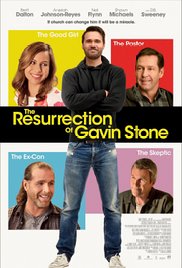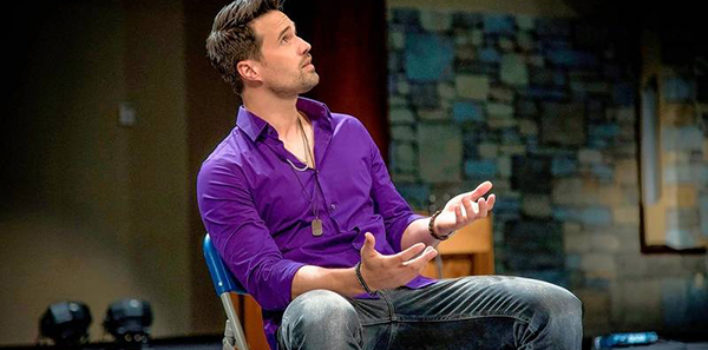Review| The Resurrection of Gavin Stone
 The Christian film industry is a strange sub-genre. I remember the fervent debate in high school amongst my friends over whether it was okay to watch the party scenes in How to Save a Life. But Fireproof and Courageous were certainly kosher and I recall seeing the latter in a theatre packed with Christian friends. We cheered when our understanding of salvation was clearly articulated and left the theatre entertained and affirmed in our beliefs. We also handed out gospel tracts at the theatre door, just in case anyone in the audience missed the film’s message.
The Christian film industry is a strange sub-genre. I remember the fervent debate in high school amongst my friends over whether it was okay to watch the party scenes in How to Save a Life. But Fireproof and Courageous were certainly kosher and I recall seeing the latter in a theatre packed with Christian friends. We cheered when our understanding of salvation was clearly articulated and left the theatre entertained and affirmed in our beliefs. We also handed out gospel tracts at the theatre door, just in case anyone in the audience missed the film’s message.
In this context, The Resurrection of Gavin Stone is unusual. For one, the film is a comedy. There are no high-stake lifesaving scenes in which a marriage or one’s eternity is on the line. Also, its plot revolves around a washed up child celebrity and it features a supporting role by an actual celebrity, former WWE star Shawn Michaels. In fact, the film was produced by WWE Studios, yet another example of wrestling giants courting evangelicals. Finally, the film is surprising because its story is focused on an outsider entering the mainstream evangelical culture.
After a wild party (vaguely described and never depicted), B-line celebrity Gavin Stone is assigned two hundred hours of community service at a megachurch in his hometown near Chicago. The charmingly cocky actor, reminding me of a member of N’Sync with his button down shirt and silver jewelry, prepares for a month of clearing toilets, only to realize two things. First, the church is putting together a big budget passion play and is in desperate need of an actor with stage presence to play Jesus. Why scrub when you can perform? Second, the pastor’s daughter directing the program is young, single, and Gavin thinks she’s pretty. Since only Christians are allowed to play Jesus, Gavin fakes being born again and spends the rest of the month learning how to fellowship with his new brothers and trying to get the pastor’s daughter on a date.
 If you’ve spent anytime both inside and outside Evangelical culture, the film is genuinely hilarious when it brings these two worlds together. Gavin’s attempt to persuade the congregation to give him the role of Jesus requires giving a testimony, which is a mixture of re-hashed song lyrics, inspirational quotes, and Gavin’s training in improvisational acting. The Christians are fooled by his fervor and respond with hearty amens. The actor’s attempt to fit in while attending his first church service was also amusing. He eagerly greets everyone he sees with “blessings, brother”, attempts to sing along to the vague upbeat worship lyrics, and joins a row of single guys passing glances at row of single girls adjacent to them. I was immediately reminded of the many awkward visits to new churches I’ve sat through.
If you’ve spent anytime both inside and outside Evangelical culture, the film is genuinely hilarious when it brings these two worlds together. Gavin’s attempt to persuade the congregation to give him the role of Jesus requires giving a testimony, which is a mixture of re-hashed song lyrics, inspirational quotes, and Gavin’s training in improvisational acting. The Christians are fooled by his fervor and respond with hearty amens. The actor’s attempt to fit in while attending his first church service was also amusing. He eagerly greets everyone he sees with “blessings, brother”, attempts to sing along to the vague upbeat worship lyrics, and joins a row of single guys passing glances at row of single girls adjacent to them. I was immediately reminded of the many awkward visits to new churches I’ve sat through.
If you are judging this film by comparing it to other Christian films, it actually goes down fairly easily. Yes, the ending can be predicted half way through the film, and there are some rather unimaginative montage sequences. And yes, the filmmakers insist on including quickly forgettable music at the slightest provocation, and the movie seems to struggle deciding between being a comedy that pokes fun at church culture or a serious drama. But most of the performances are in good spirit, especially Shawn Michael’s relaxed portrayal of an ex-con. The movie seems to enjoy its good-humored take on the follies of evangelicalism.
But is the film revealing these follies or is it endorsing them? The jokes at our expense were well-earned and in good taste, but as the film progressed it became clear that it was celebrating a very particular version of church life. And this portrayal of church culture, if accurate, is troubling. According to the movie, discipleship is drinking root beers, talking about single girls, and humbly fixing cars for the poor. The church quickly promotes Gavin into a leadership position simply based on his ability and his showy performance of a testimony. There were no conversations examining how Christ’s salvation applied to their lives. There was no mention of grief, trials, or hope beyond the grave. It was a church that valued good times and good performances, a church easily fooled by good acting.
In the end, Gavin is won over to this faith through its people and its culture, rather than an encounter with the Christ whose life he portrays. Gavin responds to the clean and friendly lifestyle, vaguely built around the Bible and a man named Jesus, and he does so out of the hope of getting a pretty girl. The film’s one moment of surrender and brokenness is quickly assuaged by victory as Gavin is showered with applause by the whole congregation rising on their feet to thank him.
 My gut reaction to seeing this kind of church life was to shake my head sadly and be glad that I’m not one of those Christians. But I had to pause and ask myself: when are my motives for being a Christian and serving in the church similar to Gavin’s? Too often I settle for the surface levels of fellowship rather than seeking to disciple others, sharing my own trials, shortcomings, and need for redemption with those who join me in the pew. Watching The Resurrection of Gavin Stone reminded me to be vigilant in pursuit of humility. It forced me to examine my understanding of repentance and conversion. It encouraged me to love my small, low-key, faithful congregation even more.
My gut reaction to seeing this kind of church life was to shake my head sadly and be glad that I’m not one of those Christians. But I had to pause and ask myself: when are my motives for being a Christian and serving in the church similar to Gavin’s? Too often I settle for the surface levels of fellowship rather than seeking to disciple others, sharing my own trials, shortcomings, and need for redemption with those who join me in the pew. Watching The Resurrection of Gavin Stone reminded me to be vigilant in pursuit of humility. It forced me to examine my understanding of repentance and conversion. It encouraged me to love my small, low-key, faithful congregation even more.







